Spotlight Archive
As the United States celebrates 230 years of independence this July Fourth, it is a fitting time to remember the Catholics who participated in the Founding.
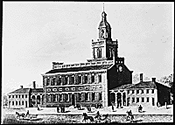 Although Catholics comprised a significant percentage of Americans only after the rise of immigration in the mid-nineteenth century, there were a few Catholics scattered throughout the colonies before 1776. Some of these played vital roles in the Revolutionary ferment that produced the American nation.
Although Catholics comprised a significant percentage of Americans only after the rise of immigration in the mid-nineteenth century, there were a few Catholics scattered throughout the colonies before 1776. Some of these played vital roles in the Revolutionary ferment that produced the American nation.
For some revolutionaries, Catholics were intrinsically suspicious allies in the fight for independence. The Quebec Act of 1774, which established the Catholic Church in that province, was one of the precipitating events of the Revolution. It stoked colonists’ fears of an alliance between the British monarchy and the Roman pontiff, the two authoritarians conspiring against the rights of free Englishmen.
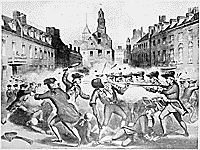 Many Catholics nonetheless fought for independence. The preeminent Catholic patriot was undoubtedly Charles Carroll of Carrollton. Heir to the fortune of an early Maryland Catholic family, it was said that Carroll risked more (in financial terms) than any other when he became the only Catholic to sign the Declaration of Independence.
Many Catholics nonetheless fought for independence. The preeminent Catholic patriot was undoubtedly Charles Carroll of Carrollton. Heir to the fortune of an early Maryland Catholic family, it was said that Carroll risked more (in financial terms) than any other when he became the only Catholic to sign the Declaration of Independence.
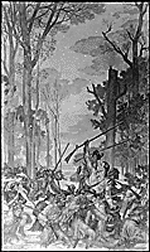 Caroll’s cousin, John, was also an important figure in Revolutionary America. John Carroll had been a Jesuit priest before the suppression of the order by Pope Clement XIV and had continued to minister as one of the colonies’ few priests. Uniquely positioned as an ardent patriot and a Catholic religious leader, he was called upon by the Continental Congress to join Benjamin Franklin, Samuel Chase and Charles Carroll on an unsuccessful mission to Canada to try to convince the colonies’ northern neighbor to maintain neutrality during the war with Britain. Carroll would become the first American bishop in 1789.
Caroll’s cousin, John, was also an important figure in Revolutionary America. John Carroll had been a Jesuit priest before the suppression of the order by Pope Clement XIV and had continued to minister as one of the colonies’ few priests. Uniquely positioned as an ardent patriot and a Catholic religious leader, he was called upon by the Continental Congress to join Benjamin Franklin, Samuel Chase and Charles Carroll on an unsuccessful mission to Canada to try to convince the colonies’ northern neighbor to maintain neutrality during the war with Britain. Carroll would become the first American bishop in 1789.
A thousand miles to the west, another Catholic with less economic clout and fewer connections would also play an important part in the military plans of the Americans. Father Pierre Gibault was a missionary of French descent in southwestern Indiana. When the Virginia militia under Colonel George Rogers Clark entered the area, Gibault and others met the American commander and pledged the support of the region to the forces of independence in return for assurances of religious freedom. Against the wishes of the bishop of Quebec, Gibault led the French residents of the Vincennes region in cooperating with the Americans.
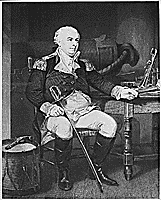 One important dimension of the Revolutionary War was the battle at sea. The Americans played David to the British Navy’s Goliath, but their merchantmen were able to pester the English ships and run their blockades. A key personality in this accomplishment was Irish native John Barry, who captained a number of vessels during the war. John Barry Kelly sums up the commodore’s accomplishments thus:
One important dimension of the Revolutionary War was the battle at sea. The Americans played David to the British Navy’s Goliath, but their merchantmen were able to pester the English ships and run their blockades. A key personality in this accomplishment was Irish native John Barry, who captained a number of vessels during the war. John Barry Kelly sums up the commodore’s accomplishments thus:
Barry's war contributions are unparalleled: he was the first to capture a British war vessel on the high seas; he captured two British ships after being severely wounded in a ferocious sea battle; he quelled three mutinies; he fought on land at the Battles of Trenton and Princeton; he captured over 20 ships including an armed British schooner in the lower Delaware; he authored a Signal Book which established a set of signals used for effective communication between ships; and he fought the last naval battle of the American Revolution aboard the frigate Alliance in 1783.
Barry was George Washington’s choice to head the United States Navy when the president created it in 1794.
The infant American military relied heavily on the expertise of foreign officers, some of whom were Catholic. Marquis de Lafayette is well known as a staunch French supporter of the American cause. Polish captain Tadeusz Kosciuszko fought in Washington’s army as a colonel and made important contributions at Ticonderoga and Saratoga. Another Pole, Casismir Pulaski, led Washington’s cavalry, and died in the battle for Savannah.
Other Catholics furnished vital support for the patriot cause. A notable figure was nurse Mary Waters, whose work in patriot hospitals drew the praise of Founding Father (and physician) Benjamin Rush. Philadelphia merchant Stephen Moylan became Quartermaster General of the Contintental Army and later raised a regiment of Pennsylvanians.
Not all Catholics were revolutionaries. The Roman Catholic Volunteers were a loyalist military unit formed in Philadelphia. The New York-based Volunteers of Ireland was another regiment made up of Catholics fighting for King George. Alsace-born Joseph Cauffman, a prominent citizen of Philadelphia, remained loyal to England—though his son, Joseph, Jr., served the forces of independence as a medical doctor.
The Vatican remained neutral in the conflict and Catholics were free to choose sides. Many Catholics, conservative and anti-revolutionary, believed that their loyalty lay with Great Britain. Other Catholics thought that the Crown had forfeited Americans’ allegiance through tyranny. Events brought American victory, and the colonists became citizens of a new nation.
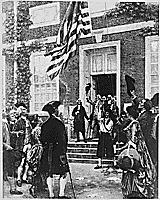 Though Catholics could be found on both sides of the conflict, the experience of fighting side-by-side with Romanists, the witness of important patriots such as the Carrolls, and the valuable support of France, convinced many Revolutionaries that Catholics were welcome collaborators in the building of a new republic.
Though Catholics could be found on both sides of the conflict, the experience of fighting side-by-side with Romanists, the witness of important patriots such as the Carrolls, and the valuable support of France, convinced many Revolutionaries that Catholics were welcome collaborators in the building of a new republic.
Catholic participation in the founding did not end with the cessation of hostilities with Britain. Thomas Fitzsimons and Daniel Carroll (John’s brother) were Constitutional Convention delegates from Pennsylvania and Maryland, respectively. They are the two Catholics whose names are affixed to the United States Constitution.
Fitzsimons had already distinguished himself as a soldier and leader during the Revolution. A native Irishmen, he was an important Philadelphia merchant who won election to an early Revolutionary government post in the face of laws barring Catholics from holding office.
Daniel Carroll had served in the Continental Congress and had signed the Articles of Confederation as well. At the constitutional convention, he championed ideas such as popular election of senators and reserving to the states all powers not explicitly delegated to the federal government.
American Catholic historians of the late nineteenth and early twentieth century, through their research and writing, did much to preserve the record of Catholic participation in the founding. John Glimary Shea worked tirelessly to uncover historical documents for the colonial and republican eras, and published a four-volume History of the Catholic Church in the U.S. Martin I.J. Griffin, concerned to present a balanced account of Catholics’ role—and to highlight the achievements of fellow Philadelphians—wrote about loyalists such as the Roman Catholic Volunteers, as well as patriots such as Thomas Fitzsimons and John Barry. Griffin edited the earliest major American Catholic historical journal, the Records of the American Catholic Historical Society. Library of Congress official Gaillard Hunt (who was married to John Carroll’s grandniece) and Father John Rager investigated the intellectual origins of the founding documents, tracing many of their ideas to Catholic thinkers of the medieval and Reformation periods.
Through the work of these and many other scholars, students of the Founding can come to appreciate the ways in which Catholics helped to shape the contours of this critical period in American history.
Photos, from top: Independence Hall; Boston Massacre; George Rogers Clark's March on Vincennes; John Barry; Flag Raised at Independence Hall. All courtesy of National Archives and Records Administration (unrestricted)
Sources and further reading (See full bibliography on Catholics and the Founding)
